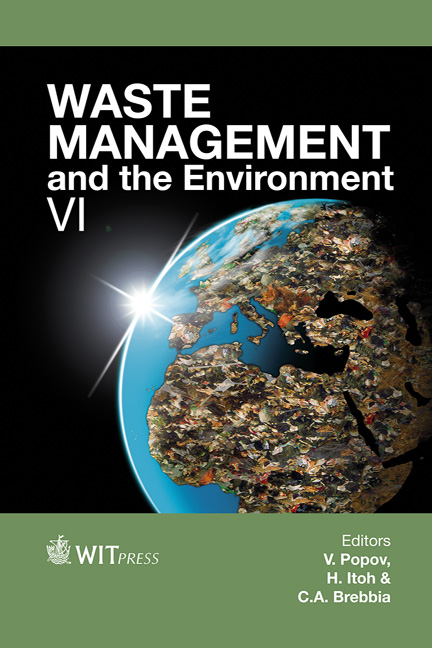Benefit Of Composting Application Over Landfill On Municipal Solid Waste Management In Phnom Penh, Cambodia
Price
Free (open access)
Transaction
Volume
163
Pages
12
Page Range
61 - 72
Published
2012
Size
394 kb
Paper DOI
10.2495/WM120061
Copyright
WIT Press
Author(s)
B. Seng & H. Kaneko
Abstract
This paper presents an insight into benefits of organic waste recycling through composting over landfill on municipal solid waste management in Phnom Penh, in terms of greenhouse gases (GHGs) mitigation. Future waste generation from 2003 to 2020 was forecasted and four scenarios of organic waste recycling were carried out. Organic wastefood and garden wastewere used for composting and the remaining waste was landfilled. The recycling scenarios were set based on organic waste generated from difference sources; scenario 1: no recycling, scenario 2: household organic waste; scenario 3: market, restaurant, school and hotel organic waste, and scenario 4: all generated organic waste. The results showed that MSW generation in MPP increased significantly from about 0.24 million ton in 2003 to 0.41 million ton in 2010 and was projected to reach 1.02 million tons in 2020. Composting gave better benefit than landfill. It could reduce GHGs emission of 36.2%, 12.8% and 65.0% from scenario 2, scenario 3 and scenario 4 compared with scenario 1 (all generated waste is landfilled), respectively. These percentages reflect the amount of GHGs emission of 3.23, 1.14 and 5.79 million tons CO2eq from the above respective scenarios. Hence, composting could be a potential GHGs mitigation option for MPP. Keywords: composting, GHGs, GHG inventory, scenario analysis, solid waste management, Phnom Penh, Cambodia.
Keywords
composting, GHGs, GHG inventory, scenario analysis, solid wastemanagement, Phnom Penh, Cambodia.





